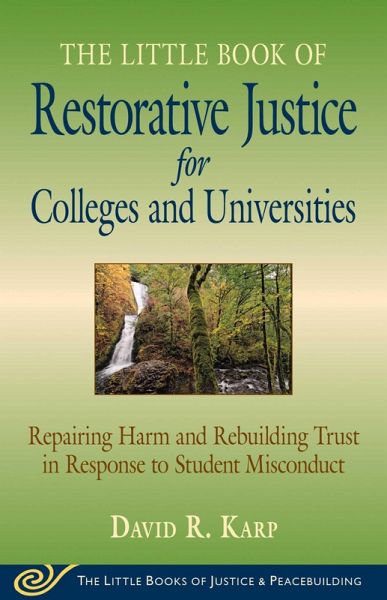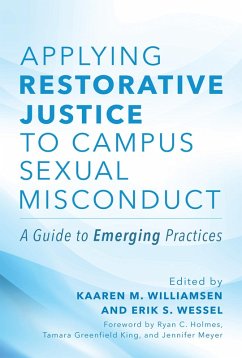
Little Book of Restorative Justice for Colleges & Universities (eBook, ePUB)
Revised & Updated

PAYBACK Punkte
0 °P sammeln!
Here's a call to colleges and universities to consider implementing restorative practices on their campuses, ensuring fair treatment of students and staff while minimizing institutional liability, protecting the campus community, and boosting morale. From an associate dean of student affairs who has put these models to work on his campus. Restorative justice is a collaborative decision-making process that includes victims, offenders, and others who are seeking to hold offenders accountable by having them (a) accept and acknowledge responsibility for their offenses, (b) to the best of their abi...
Here's a call to colleges and universities to consider implementing restorative practices on their campuses, ensuring fair treatment of students and staff while minimizing institutional liability, protecting the campus community, and boosting morale. From an associate dean of student affairs who has put these models to work on his campus. Restorative justice is a collaborative decision-making process that includes victims, offenders, and others who are seeking to hold offenders accountable by having them (a) accept and acknowledge responsibility for their offenses, (b) to the best of their ability, repair the harm they caused to victims and communities, and (c) work to reduce the risk of re-offense by building positive social ties to the community. David Karp writes in his introduction, "As a student affairs administrator, I have become deeply committed to the concept and practice of restorative justice. I have experienced how it can work given the very real pressures among campus conduct administrators to manage high case loads, ensure fair treatment, minimize institutional liability, protect the campus community, boost morale in a division with high turnover, and help students learn from their mistakes without creating insurmountable obstacles to their future successes."
Dieser Download kann aus rechtlichen Gründen nur mit Rechnungsadresse in A, B, BG, CY, CZ, D, DK, EW, E, FIN, F, GR, HR, H, I, LT, L, LR, M, NL, PL, P, R, S, SLO, SK ausgeliefert werden.













